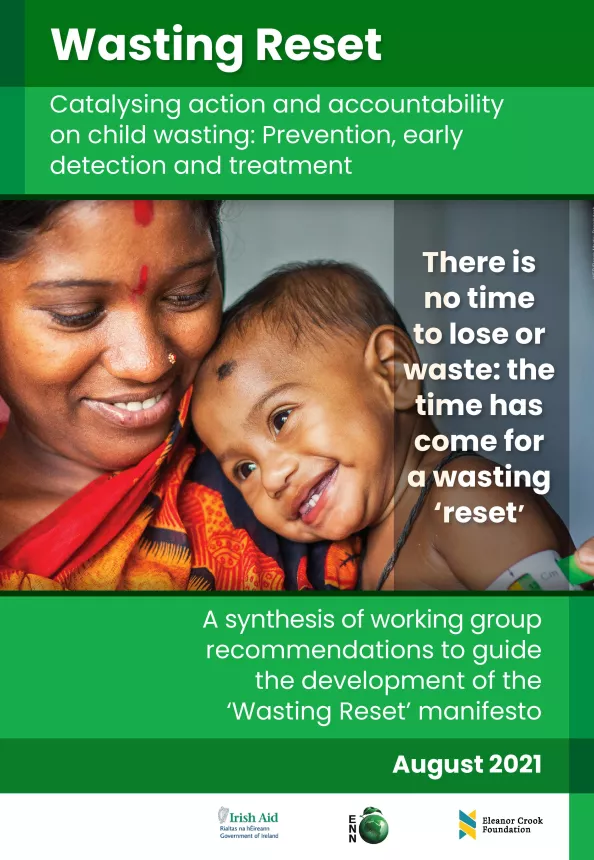Wasting 'Reset'- Catalysing action and accountability on child wasting: Prevention, early detection and treatment
Publication details
A synthesis of working group recommendations to guide the development of the ‘Wasting Reset’ manifesto
Wasting is the most visible type of malnutrition and carries the highest risk of death. Children with severe wasting are nine to 12 times more likely to die than healthy, well-nourished children (Olofin et al., 2013). Despite strong evidence on solutions that work, we urgently require higher levels of political commitment and financial investment to ensure that no child suffers or dies from a condition that is entirely preventable.
In recent years, while there has been an increased interest in, and investment aimed at, reducing wasting, including strong support from national governments, the pace of progress has been much too slow to achieve global goals and targets. Historically, wasting has not received as much attention as other types of malnutrition (Gross & Webb, 2006). Little progress has been made towards achieving the Sustainable Development Goal 2 (SDG 2) (Zero Hunger) target, which calls for less than 3% prevalence of wasting by 2030 (WHO & UNICEF, 2018). To save lives and stop millions of children becoming gravely ill each year, we urgently need to intensify our efforts to reduce child wasting worldwide.
We therefore need a ‘reset’ of childhood wasting prevention, early detection and treatment. This reset aims to galvanise multiple stakeholders around the key actions needed to stimulate progress and ensure accountability in the 2022-2030 period, and will be used by governments and organisations to inform their political and financial commitments to tackle wasting.
Why is this reset needed?
Action and accountability for wasting must be urgently elevated from technical domains to political levels, and from a medicalized problem to one that is addressed via improvements in food systems. This ‘reset’ is needed because progress in tackling child wasting has been much too slow, due to numerous constraints. To address these constraints, an interagency effort involving multiple stakeholders has developed a series of consensus-driven actions and solutions across six key themes.
What are the constraints and how will this reset address them?
Numerous blockages hampering the scale-up of wasting prevention, early detection and treatment were identified across each of the six themes, ranging from inadequate and irregular financing to fragmented leadership and poor coordination, lengthy processes for innovation, and insufficient attention to preventive actions across all contexts, etc. We make the case that concerted action by multiple stakeholders on the priority recommendations outlined in this brief can significantly move the dial on child wasting.
How does this reset build on existing initiatives?
Each of the working groups used the United Nations joint Global Action Plan (GAP) and the United Nations Children’s Fund’s (UNICEF’s) No Time to Waste documents as the starting point for discussion (see Box 3). This reset therefore builds on the important work done to date, but goes further, by defining specific actions required across the six themes in clear and concrete ways. This process has mobilised a broader set of stakeholders who can complement the key United Nations efforts through mobilising their skills and energy to ensure transformative, enduring solutions.
A final important point is that this reset emphasises the need to strengthen accountability at global and national levels, focussing on objective mechanisms such as the Global Nutrition Report.
